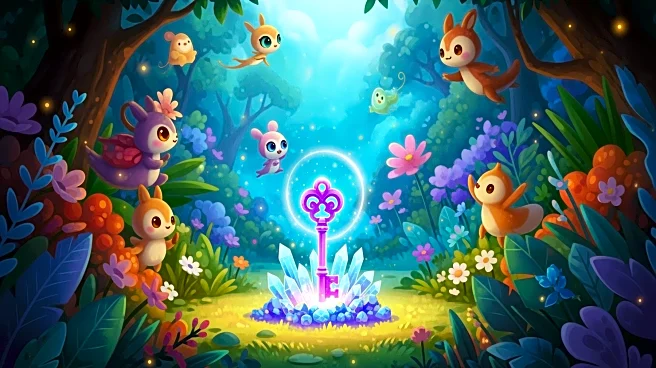What's Happening?
Nintendo has announced the release date for Pokémon Pokopia, a new spin-off game that combines elements of Animal Crossing and Minecraft. Scheduled for release on March 5, 2026, the game will be available
on the Nintendo Switch 2. Pokémon Pokopia allows players to create a Pokémon paradise, taking on the role of a Ditto with human-like features. Players can collect materials, build furniture, grow vegetables, and create homes for Pokémon, inviting other players to visit their creations. However, the game will be released on Nintendo's controversial Game-Key Cards, which require an internet connection to download the full game, raising concerns among game preservationists.
Why It's Important?
The release of Pokémon Pokopia on Game-Key Cards highlights ongoing debates about digital versus physical media in gaming. While Game-Key Cards offer a physical component, they still necessitate digital downloads, which could impact game preservation and storage space on consoles. This development is significant for Nintendo as it navigates consumer expectations and technological advancements. The controversy may affect consumer trust and influence future decisions regarding game distribution methods. Additionally, the game's unique blend of popular gaming elements could attract a diverse audience, potentially boosting Nintendo's market presence.
What's Next?
As the release date approaches, Nintendo may face increased scrutiny from game preservationists and consumers concerned about the implications of Game-Key Cards. The company might need to address these concerns through public statements or adjustments to their distribution strategy. Additionally, the success of Pokémon Pokopia could influence Nintendo's future game development and marketing strategies, particularly in terms of integrating popular gaming elements and addressing consumer feedback. The reception of the game upon release will likely impact Nintendo's approach to similar projects and their overall market strategy.
Beyond the Headlines
The use of Game-Key Cards raises ethical questions about consumer rights and the preservation of digital media. As gaming continues to evolve, companies like Nintendo must balance innovation with consumer expectations and preservation concerns. This situation could prompt broader discussions within the industry about the future of game distribution and the role of physical media in a digital age.








